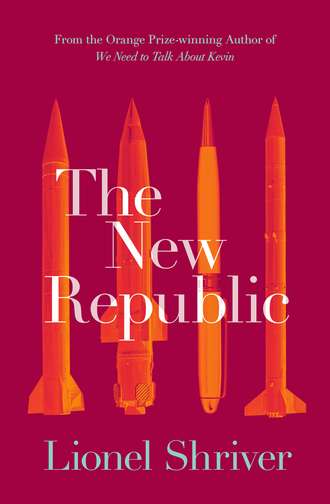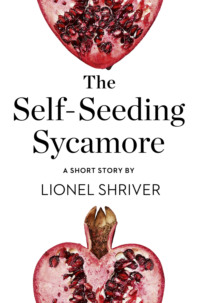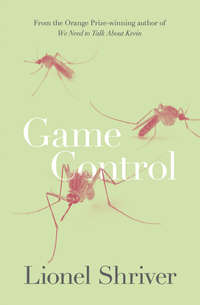
Полная версия
The New Republic
“What happened?” asked Edgar.
“With couples, it’s more often who.”
“Let me guess,” said Edgar.
“You’re quick,” Pyre conceded. “You’ll need to be. Those aren’t easy boots to fill.”
“Another devoted fan?” asked Edgar dryly.
“I deplore the man,” said Pyre, and for the first time Edgar warmed to the veteran hack. “He’s everything that gives journalists a bad name: arrogant, irresponsible, inaccurate. He thinks he’s bigger than his story. Barba, well, he thinks he owns Barba, as if he made the place up. He’s unserious. Saddler’s seen a lot of the world, and at its worst. But I have, too—Lebanon, Somalia—and it’s the dickens not to simply turn nasty. But Saddler, Saddler’s reaction has been hysterical. I mean he finds everything funny. Me, I’m not amused. Saddler covers terrorist incidents as if they’re practical jokes. But I’ve had one pulled on me.” Pyre patted his bad leg. “In eighty-three, I was conducting an interview near that Marine barracks car bomb in Beirut. Though I got off light, I’ll never play tennis again. Saddler thinks that’s a hah-hah. But I liked playing tennis.”
“You still talk about him in the present tense.”
“Barrington Saddler would never submit to anything melodramatic without an audience. I doubt he takes a dump without someone watching.”
“Even flamboyant fatheads get run over by buses,” Edgar countered.
“Saddler would more likely run over the bus himself.”
“He’s that much of a load?”
“He’s that determined that nothing get in his way. Now, can I introduce you to a few of your colleagues? Though don’t expect overnight fast friends.”
“How did I manage to step on toes from twenty feet?”
“By not being Merry Barry. Since Saddler jumped ship, the pulse of this town has slowed to hibernation levels. Truth is, I kinda miss hating the guy.”
chapter 7
Edgar Meets His New Little Friends
“Are we still playing, or not?” asked the blonde, whose face had that clear-eyed, clear-skinned symmetry used to sell moisturizing cream, but that for the life of him Edgar could never find sexy.
Win Pyre thumped his cane on the carpet and made introductions.
“Am I interrupting something?” asked Edgar.
“Yes, thank God. Party games.” The reporter for the London Guardian, Roland Ordway, spewed a thin stream of smoke. His spiky black hair sprayed at the cleverly balanced Katzenjammer angles of a pricey designer cut. Young and sleazily good-looking, Ordway kept the arms of his sports jacket jammed above his elbows, and his jeans were ironed with a crease. As for the cowboy boots, Ordway was the sort of Brit who thought Americana was hip so long as Americans didn’t come with it.
“What’s the game?” Edgar bounced onto the balls of his feet, literally on his toes.
“To name the game is to lose it.” Sucking his ciggie, Ordway pinched the butt from underneath.
“Let Trudy explain, then,” said the frump on the loveseat, a correspondent for the Washington Post whose name was Martha Hulbert. “She adores losing.”
Martha was one of those women who look terrible on purpose. Her shapeless dress was scalloped with chintzy gold-painted plastic chain at the waist, its fabric the corrupted green of aged broccoli florets; imagining any woman walking into a store and choosing this spoilage-colored sack boggled the mind. Martha might have looked presentable if she lost twenty pounds, but Edgar knew the sort: all her life she’d hug those twenty pounds like a kid with a stuffed bunny.
“We’re timing ourselves,” said Ordway. “To see how long we can go without mentioning He Who Is No Longer With Us. There. A black mark for me.”
“It’s a stupid game,” said Trudy Sisson, the cover-girl blonde whom Pyre had introduced with a curdled lip as a “freelance photographer.” In this case “freelance” appeared to mean “bankrolled by Daddy,” and in Pyre’s mind Trudy Sisson’s bowling-pin calves and syrupy Southern accent must have dropped her IQ thirty points. Edgar had ridiculed his share of secretarial bimbos at the firm, but like the smell of your own armpits prejudice is less obnoxious when it’s yours, and for the moment he felt sorry for her. He’d get over it.
“Leastways when Barrington comes up it’s a little like he’s still here,” Trudy went on. “For a few seconds we have some energy. And I wanted to hear about the twins.”
“I gather they’re still not speaking,” said Martha.
“Lucky us,” said Ordway. “Remember what they said?”
“Sorry.” Martha glanced dutifully at Edgar. “Bear had an affair—”
Ordway began to singsong, “Bear had an affair with two twins—”
“A team, once upon a time,” Martha persevered.
“And shimmied all four shapely shins—”
“Roland, if you don’t mind, I’m trying to be polite!” said Martha sharply. “They wrote and photographed for Esquire. Very successful duo—”
“’Til one bim said, ‘Mister! You’re shagging my sister! Confess your identical sins.’”
“Behold the Bard of Barba,” said Martha, rolling her eyes. “Anyway, each found out about the other—how would they not? And you’ve never seen such a falling out. It would have made more sense to turn on Barrington, but they went for each other instead. Operating on the ridiculous premise that the one who tore the most hair would win the two-timing trophy.”
“I’ve never thought he cared fuck-all for either one of them,” said Ordway. “He just wanted to watch the cat fight.”
“It was malicious,” said Martha primly. “He saw how close they were. Just like—” Martha glanced furtively around the room, then lowered her voice—“you know. Anyway, they wore each other’s clothes, finished each other’s sentences. Erin told me once that they sometimes had the same dreams. Now they despise each other, and Mary’s defected to Vanity Fair. It was tragic and he did it on purpose. Emotional vandalism, if you ask me.”
“Oh, don’t be so moralistic,” said Trudy. “Barrington got bored so Barrington slept around.”
“You should know,” said Ordway.
Trudy raised her chin. “But can you blame him? I wake up the day after he disappeared—or whatever, I’m too scared to think about it. I look around and think, I’m living in a dump. The food stinks, the beer stinks, you can’t even lie on the beach ’cause it’s too cold, not to mention the wind. I think, one more blast up my skirt, one more whoosh wrecking my hair and I’m booking for the States. Well, it didn’t seem that way before. With Barrington, Barba was exciting. Y’all feel the same way but won’t admit it.”
“Another beer, Kellogg?” asked Pyre.
“You just want to watch me commit hairy-peary again,” said Edgar.
The awful pun cast a pall.
“Barrington already used that line,” said Trudy, glaring.
“Definitely going to need that beer,” said Edgar, turning to fetch it himself. Jesus. Saddler had even beaten him to the jokes.
Edgar lingered by the drinks to look around. As if rendered freehand, everything in the room was subtly imperfect. The cushions’ needlework was lumped with tufty bits. The throw rug beneath Edgar’s feet included one aberrant purple stripe that, while it looked like a mistake, also electrified the pattern and was the sole reason the rug drew his eye. None of the picture frames was quite rectangular, and the original watercolors within were fraught with charming little errors in perspective. The ceramic tiles around the fireplace were crookedly inlaid. The pitcher on the drinks table canted to the left. Spearing a pickled onion, he noticed that the handles of the wooden hors d’oeuvre forks were whittled into animals, and it was impossible to tell if this one was a lion or a sheepdog.
At first Edgar assumed that Nicola was a boutiquey sort who shopped at import outlets, except these objects exhibited neither the soullessness of mass production nor the shoddiness of some arthritic Third Worlder hacking out cocktail forks for ten cents an hour. Rather, every curtain, upholstery job, and one-of-a-kind dessert plate bore the indelible imprimatur of the same gently perverse sensibility. Like Martha Hulbert’s frumpiness, the living room’s appointments were flawed on purpose.
When Nicola rearranged the sandwiches, Edgar commended, “You’re quite a cook.”
She sighed. “I’m afraid no one has much appetite tonight.”
“So—you a journalist yourself?”
“Gracious, no. I’m a housewife.” The admission was cheerful.
So rarely had Edgar met women in New York who confessed to doing nothing that he floundered for lack of follow-up. “To support you, and this house—which is big …”
“Not as big as yours.”
“It’s just, Henry must be doing okay.”
“I wouldn’t say that Henry’s okay.”
“Financially, I mean.” Instead of nosing into their bank statement he should have asked if she had kids, but he too badly didn’t want her to have any.
“Even financially,” Nicola reflected, “I’d not describe Henry as okay. In fact, Henry’s financial situation is woeful. That is, full of woe.”
Edgar was determined not to drop another clangor like, So you weave your own rugs because you can’t afford commercial ones. He held up the dog-lion end of his fork. “Is there anything in this house you didn’t make?”
Nicola scrutinized the room. “Of course. The wine glasses—I haven’t learned to blow glass yet, but I’d love to … And I didn’t make nearly all the furniture, because Henry put his foot down. It takes too long, and he didn’t want to eat off the floor.”
“This handicrafting. It’s some kind of policy, then?”
“I don’t have policies. I have whims. I’m a total child, Edgar. All I do is play. In adult terms, I’m a dabbler. I can’t explain, but there’s something about scooping lettuce from a salad bowl that you carved yourself. Preferably lettuce from your own garden, but nothing grows in this godforsaken province other than peras peludas.
“In our case, these whims of mine have proved a funny antidote. Henry has a closetful of designer silk and Italian suede, but he’s much safer walking around in hand-sewn cotton. If I had the time he’d wear cloth I wove as well—from thread I spun, from cotton I ginned, but obviously there are limits. A homemade shirt might not hang quite right, but it’s a kind of protection.” She hung her head. “The last few months he’s gone back to the Calvin Kleins. I don’t blame him, but I think it’s dangerous.”
“Why’s that?” Edgar was completely out of his depth.
“I’m talking about the conservation of meaning,” she said passionately. “When you’re young, you take significance for granted. In childhood, every silly clockwork donkey, or your first garish pink lipstick, is important. Then the problem is the opposite: you’re overpowered by meaning, drowning in it. But later … Well, I can’t go buy Henry a present, can I?”
Edgar could only intuit vaguely that they had money troubles.
“Barrington understood,” she added sadly. “But Barrington collected meaning like lint. Like that Peanuts character: it followed him in a cloud.”
“You’re the only one I’ve met so far who mentions him in the past tense.”
“It’s a discipline.”
“I hope your, um, circumstances don’t mean you’ll have to clear out of this house,” said Edgar. “It’s cool.”
“I’m sorry, I’ve misled you. You’re new here, you must be knackered after your long journey, and here I’m being coy. Don’t worry about our being evicted, Edgar. We own this house and five others all over Europe. But I’m a little tired myself. If you don’t mind, we won’t get into it now.”
Dismissed and disconcerted, Edgar drifted back to the knot of gossips in the corner, his gate a bit unsteady. He’d switched to Heineken but eyed the brown bottles of Choque, curiously magnetic. The stuff was awful, punishing, but, much like the subject of Mr. Saddler, inexplicably difficult to leave alone.
At least when Edgar rejoined the group they’d moved on, which was probably the work of the visiting German from Der Spiegel. In his fidgety silence, Reinhold Glück had seemed impatient with ceaseless scuttlebutt on someone he didn’t know. Serious and bespectacled, Glück was doing a feature comparing O Creme de Barbear with German neo-Nazis. Edgar recognized the tone before penetrating the German accent; liberal indignation whiffled with the same strident huffiness all over the world.
“It is nothing but racism!” said Glück.
“We’re not talking about a handful of funny-sounding visitors,” said Trudy, crossing her legs. “What about all those Turks in Germany? What if there were more Turks than Germans? If they could vote your prime minister out of office—”
“Chancellor,” said Martha.
“Whatever. And you walk down the street and everyone’s talking Turkish? And it’s hard to find a Pilsner anymore, like, all you can find is, I don’t know, mead, or whatever Turkish people drink. Know what a place like that’s called? Turkey. There wouldn’t even be a Germany anymore. Wouldn’t that tee you off? Where’s your national pride?”
“The whole world has suffered for Germany’s national pride,” said Glück. “I have a different kind of pride.”
“Well, I have American pride,” said Trudy. “Us Floridians have Cubans, Haitians, and Mexicans up the wazoo. When I grab a cab, if I don’t know Spanish for ‘airport’ the cabby looks at me like I’m the nitwit. In Miami, I feel like a foreigner in my own country.”
“In a truly pluralistic society, all people feel equally foreign and equally at home. You are not talking about being American, but about being white and in control. It is the same in Barba. The fascists in O Creme only want to stay in power—”
“I’m with you in theory, Reinhold,” said Martha. “Still, nobody in crappy little Barba has power of any description to hang on to.”
“They do now,” said Ordway. “Whole bloody Western world is up in arms about immigration in crappy little Barba. That’s power. Look at us: we live here, we file from here, we’re consumed with local politics. And we’d never have considered so much as a bargain package holiday to this filthy bog five years ago.”
“That impresses you?” said Edgar.
“It is impressive, innit?” Ordway’s standard middle-class London accent was decorated with lowbrow touches. Translate: white geeks from Long Island lacing their conversation with yo! and I hear dat! like the brothers in the ’hood.
“The Sobs having murdered over two thousand people—that impresses you, too?” The journalistic penchant for calling members of the SOB the Sobs and their political counterparts in O Creme de Barbear Creamies had first jarred as swaggeringly familiar, but Edgar got a charge out of tossing off the jargon himself.
“Kellogg, don’t be so earnest!” said Ordway. “There must be some bloke side of you that fancies their flash. The Sobs have Interpol, the FBI, the CIA, the Portuguese Army, and the local coppers combing every pera peluda peel of Barban rubbish, and nobody can find a trace of them. Even Creamies keep their hands clean. They get lifted, but the next week they’re back on the street when nothing sticks. Other than the author of that sodding autobiography, I Was an SOB—a load of bollocks, in my view—no one’s dug up a single bona fide member of that lot in five years. That’s impressive, mate.”
“Only to little boys,” said Martha.
“Already, half the schoolchildren in the States are Spanish-speaking,” Trudy was preaching fervently to Reinhold. “And kids grow up. They’re taking over!”
“Majority status is no people’s right,” Glück insisted. “It is an accident, a lucky advantage. Like any advantage you want to hold on to it. But it is typical reasoning of privileged people to assume that just because you have something, ipso facto you deserve it. In truth, this ‘defense of borders’ is naked defense of self-interest—not of justice.”
“I still think Verdade has a point,” said Trudy sulkily. “If I were Barban, I’d sure get peeved with hordes of North African Muslims overrunning my home. These immigrants don’t have any money—”
“From what I have read, the Moroccans are much more industrious than the lazy native Iberians,” said Glück. “And Moroccans don’t blow up airplanes, either.”
“Okay, the Creamies are extreme,” said Trudy. Recrossing her legs, she added slyly, “But you gotta admit: Tomás Verdade is pretty sexy.”
“Violence puts an issue on the map,” Ordway was lecturing Edgar. “Sob tactics may not be pretty, but they’re sussed. No casualties, we’re not even having this conversation.”
“I’d concede that targeting world powers is smart,” said Edgar, beginning to get in the swing. “Terrorizing has-been Portugal wouldn’t work. No one would give a shit.”
“Yes,” Ordway droned wearily. “That observation has been made before.”
Edgar flagged the jaded response. By nature he had both a good feel for the trite and a special aversion to it. He could pinpoint the exact instant when having a “bad hair day” was no longer funny.
“Anyway,” said Ordway, “you’ll soon clue that your new profession is dull as ditch water unless someone gets hurt. I covered the Quebec referendum on secession: few punch-ups, a bit o’ shouting. Even my mum used the paper to line her kitty-litter box.”
“News isn’t entertainment,” said Edgar.
“News is exclusively entertainment,” said Martha, “according to Barrington.”
“Ten minutes, girls and boyos!” Ordway exclaimed, checking his watch. “A record.”
chapter 8
Ninety-Nine Push-Ups and Cloudberry Shampoo
At a pat on his shoulder, Edgar jolted upright. Nicola laughed. “You look like a vento head!” she teased. “Can I drive you home?”
Unchivalrously, he accepted the lift. After Nicola went up to fetch her car keys, she met Edgar in the foyer with a significant glance. “Before I forget.” From the folds of her cloak, she withdrew an oversize brass skeleton key, its head cast with runes, as if it might open a chest of gold doubloons or a secret medieval torture chamber. The key was heavy, with a smaller, modern key attached, and so made quite a clatter when she dropped it on the flagstones. As she dived to scoop it up, Henry was walking up the stairs.
“No, let me,” said Edgar, lunging for the set. “My keys,” he said to Henry, “from the Record. Dropped them. Clumsy of me. Must be tired.”
Henry blinked. The key was distinctive. Something didn’t quite compute. Still Nicola looked, though whiter by a shade, relieved.
“That was quick thinking, in the foyer,” said Nicola, as they pulled off in her Land Rover. “Thanks.”
“You may be a dandy rug weaver,” said Edgar. “But when it comes to the art of deception, you suck.”
She smiled, tightly. “I’m not sure if I should be offended by that, or not.”
Edgar delivered a few slash-slash assessments of her other guests, but Nicola didn’t pick up, and Edgar feared that he’d just queered the goodwill of one of those if-you-can’t-say-anything-nice types.
“I’m sorry that your new home won’t have been tidied,” she said. “It was left more or less au naturel. Not that Barrington was a slob—I mean, he was, but after these big, impromptu dos of his a few guests were always eager to stay and clear up. Some nights—mornings, rather—they actually fought over the Hoover. I dare say there were certain young ladies who’d have scoured his toilet bowl with their own toothbrushes.”
“No, the real test,” Edgar mumbled, “is whether they’d use them after.”
“Funny, some people go missing for weeks, and no one notices until a frightful smell starts leaking from their flats. But the alarm went out about Barrington in a matter of hours. He was meant to dine at Trudy’s that night. She’d made beef Wellington, of all things, an all-day-in-the-kitchen affair that Barrington had once mentioned in passing that he fancied. Foie gras, wild mushrooms, goodness knows what else. She insisted on making the puff pastry from scratch; the leaves came out a bit thick. Me, I find it’s often the simplest … Oh, never mind.
“He was always late, of course, but he’d usually make an appearance. I’m afraid that Trudy’s having gone to so much bother would count for all too little, but there’s not that much to do here, and the rest of us were all at Trudy’s.”
“More to the point, you were at Trudy’s.”
Nicola ignored the insinuation. “By two a.m. she was hysterical. We all thought she was overreacting, upset about having made rather a hash of the beef (not to be unkind, but it came out a tad well-done, and there was no disguising that cutting the crust was hard work). We thought she was hurt that after all her talking up the dish he’d made other plans. The dear girl has made great capital since from her intuition that something ghastly was wrong. How she felt ‘a wash of cold air’ and ‘suddenly Cinzeiro felt empty.’ She claims she’ll never again eat beef Wellington—which she insists on calling ‘beef Barrington’ in tribute. Well. Not much danger, in Barba.
“I’ve only been back to Barrington’s once,” she continued. “And please don’t mention it to Henry. But I simply couldn’t bear the idea of the police smashing that lovely cedar door with a battering ram. So when Barrington became an official missing person, I rang the chief inspector and arranged to let him in.
“The detectives went through everything,” she explained. “All they found was some gibberish on Barrington’s computer disks. Nonsense, according to Lieutenant de Carvalho. There was only one part of the house I steered the police away from. A small tower; they never noticed the door. You’ve the key to its padlock. But Barrington told me not to go up there. So I haven’t.”
“Even Bluebeard’s wives didn’t play along with that shit,” Edgar slurred. “You always so obedient?”
“When I make a promise.”
Including to your husband? “What do you think’s up there, then? Bodies?”
“Maybe one. That’s the only place we haven’t checked for Barrington. But on the off chance … I guess I didn’t want to know.”
She pulled up to a long dark hulk and sat, with the Land Rover idling, hands in her lap. Though the villa was virtually invisible, she closed her eyes, as if for good measure. “It does light up,” she said dismally, all but spelling out: Though only when a certain someone was inside.
Edgar fumbled his good-byes and trundled with his bags to the dim front porch. The lock responded gladly to his skeleton key. Pushed by the Barban gale, the thick cedar door opened by itself, as if Edgar were expected.
After groping for a light switch, he had a vague, cockeyed impression of having infiltrated a deserted sheikdom. He bumbled upstairs to a king-size four-poster. An ironing board would have sufficed. Having dragged off his clothes, he plunged into a small death.
Edgar woke between royal blue satin sheets, under billows of goose-down duvets. Pillows buttressed his every side, as if he were packed for overseas shipping. Opposite, lemony late-day sunlight filtered between shifting drapes of crimson velvet, and upper panes of leaded stained glass dolloped red and green lollipops onto the bed. A sole reminder of where he was, a high hissing whistle sang through the window cracks. Panes rattled as if o vento insano were rapping to get in, and a faint, low-pitched moan groaned outside.
According to his diving watch—in his freelance poverty so discordantly showy, yet in the context of his immediate surroundings a dime-store trinket—he’d slept fifteen hours.
Edgar propped on the springy pillows, which puffed cool air onto his cheek at every readjustment. This was indeed a master bedroom. Laid with overlapping Oriental carpets, the floor was elevated a step under the bed. Raising the four-poster into a throne of repose, the dais made fifteen hours’ sleep seem his due. Edgar could easily see settling here for days at a time amid splayed half-read books, occasionally granting an audience or tinkling a clear brass bell for breakfast service. The image of broad trays (carved camphor wood, Edgar decided, with ivory handles) hovered over both tall side tables. Spread with embroidered cloths, they’d be littered with goblets of guava juice, crumbs of honeyed pastries, ornate cups of thick, sweet coffee, and filigreed silver spoons.








